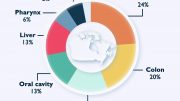
Depression and anxiety are not significantly linked to higher cancer risks for most types, according to a multinational study. While a slight increase in risk was observed for lung and smoking-related cancers among those with depression or anxiety, this was largely mitigated by adjustments for lifestyle factors.
Recent research indicates that depression and anxiety do not significantly increase the risk for most types of cancer. However, these conditions are associated with a marginally higher risk of lung and smoking-related cancers, which reduces considerably when adjusted for factors like smoking and alcohol use.
Although depression and anxiety are thought to increase a person’s risk of developing cancer, research results have been inconclusive. In a new analysis of multiple studies from the Netherlands, the United Kingdom, Norway, and Canada, investigators found that depression and anxiety are not linked to higher risks for most types of cancer among this population. The analysis will be published today (August 7) by Wiley online in CANCER, a peer-reviewed journal of the American Cancer Society.
The Theoretical Link Between Mental Health and Cancer
Experts have theorized that depression and anxiety may elevate cancer risk by impacting a person’s health-related behaviors or by inducing biological effects on the body that encourage cancer development. Previous research has shown a mixed picture: some studies indicate a link between depression, anxiety, and cancer incidence, while others suggest little or no correlation.
Examination of International Data
In an effort to gain more clarity, Lonneke A. van Tuijl, PhD, of the University Medical Center Groningen, and her team delved into data from the international Psychosocial Factors and Cancer Incidence consortium. This consortium encompasses information from 18 prospective study groups with over 300,000 adults from the Netherlands, the United Kingdom, Norway, and Canada.
Results and Implications
The researchers discovered no meaningful associations between depression or anxiety and overall, breast, prostate, colorectal, and alcohol-related cancers over a period of up to 26 years. However, depression or anxiety was associated with a 6% higher risk of developing lung cancer and smoking-related cancers. This risk was significantly lowered once other cancer-related risk factors, including smoking, alcohol use, and body mass index, were taken into account. Thus, this analysis underscores the need to address tobacco smoking and other unhealthy behaviors that may arise as a result of anxiety or depression.
Dr. van Tuijl remarked, “Our results may come as a relief to many patients with cancer who believe their diagnosis is attributed to previous anxiety or depression. However, further research is needed to understand exactly how depression, anxiety, health behaviors, and lung cancer are related.”
Reference: “Depression, anxiety, and the risk of cancer: An individual participant data meta-analysis” by Lonneke A. van Tuijl, Maartje Basten, Kuan-Yu Pan, Roel Vermeulen, Lützen Portengen, Alexander de Graeff, Joost Dekker, Mirjam I. Geerlings, Adriaan Hoogendoorn, Femke Lamers, Adri C. Voogd, Jessica Abell, Philip Awadalla, Aartjan T. F. Beekman, Ottar Bjerkeset, Andy Boyd, Yunsong Cui, Philipp Frank, Henrike Galenkamp, Bert Garssen, Sean Hellingman, Martijn Huisman, Anke Huss, Trynke R. de Jong, Melanie R. Keats, Almar A. L. Kok, Steinar Krokstad, Flora E. van Leeuwen, Annemarie I. Luik, Nolwenn Noisel, N. Charlotte Onland-Moret, Yves Payette, Brenda W. J. H. Penninx, Ina Rissanen, Annelieke M. Roest, Rikje Ruiter, Robert A. Schoevers, David Soave, Mandy Spaan, Andrew Steptoe, Karien Stronks, Erik R. Sund, Ellen Sweeney, Emma L. Twait, Alison Teyhan, W. M. Monique Verschuren, Kimberly D. van der Willik, Judith G. M. Rosmalen, and Adelita V. Ranchor, 7 August 2023, CANCER.
DOI: 10.1002/cncr.34853









Be the first to comment on "Debunking Myths: Depression, Anxiety, and Cancer Risk"